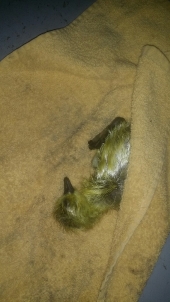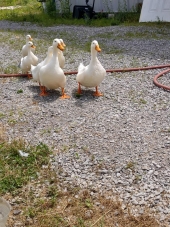




















 2
2




Symptoms of botulism
Usually affected birds are found sitting or lying on the ground, hunched over and unable to stand. They are floppy and weak, and cannot hold their heads up. Sometimes birds may just be found dead, with no evidence of struggling. There is no diarrhoea or nasal discharge and no signs of injury. Often several birds in a group are affected at the same time, particularly the largest and healthiest. This reflects the feeding habit of the birds, which tend to congregate and peck at something they find interesting, with the smallest birds being pushed away.
What causes botulism?
Botulism occurs when birds eat food or drink water containing botulism toxin. The toxin is produced by bacteria called Clostridium botulinum. These bacteria are commonly found in the soil, and thrive in rotting vegetation, food or carcasses, where they produce a very potent toxin. The toxin is also taken up and concentrated in maggots. The consumed toxin acts on the nervous system, causing weakness and paralysis. Botulism tends to be more common in the wet season, because birds are more likely to have access to wet, decomposing feed. Examples of situations where botulism can occur include birds pecking at rotten food scraps or the body of a dead bird or small animal (such as a dead mouse), or when the water level of dam or pond drops and the vegetation around the edge dies off and rots.
"We're all just walking each other home." -Ram Dass
"Be a lamp, or a lifeboat, or a ladder."-Rumi
"It's all one song!" -Neil Young




 1
1




 1
1









|
You're not going crazy. You're going sane in a crazy world. Find comfort in this tiny ad:
Free Heat movie
https://freeheat.info
|


